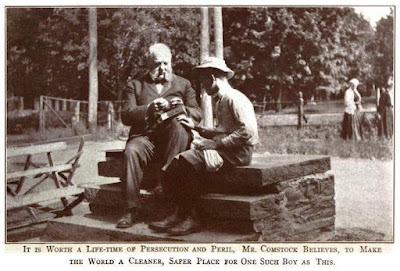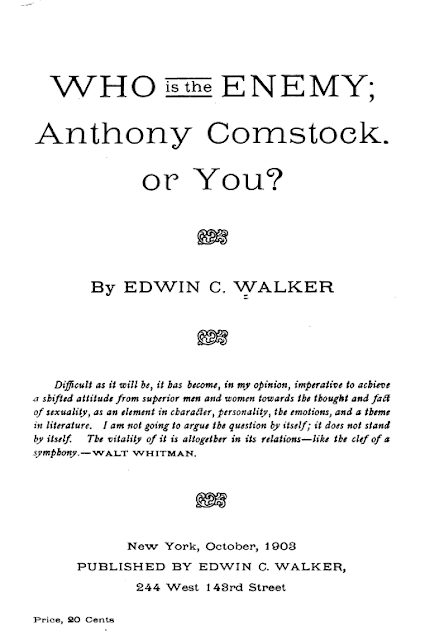 |
| Illustration from Anthony Comstock, Fighter by Charles Gallaudet Trumbull (1913) |
Attempts by state legislatures
to prevent women from procuring Misoprostol and Mifepristone through the mail
recall old times in a deeply concerning way.
Those were the days of Comstockery.
Anthony Comstock (1844-1915), who spent more than forty years persecuting Americans for engaging in activities that he deemed obscene, started his career in 1873 when he suppressed an “objectionable” book in the store where he worked as a clerk.
That year he established the New York Society for the Suppression of Vice and became the unpaid enforcer of the Comstock Laws, which he had persuaded members of Congress to pass with alacrity.
The Comstock Laws criminalized the possession and conveyance of lewd, lascivious, filthy, indecent and disgusting material and objects. Those words actually appeared in the Federal Criminal Code, Section 211, from which all Comstock Laws descended.
Thus the United States
Post Office was among the private and public institutions, organizations, and
businesses—including an old bookstore which stocked antique porn—that fell
under the control of Anthony Comstock, special agent for the postal service.
 |
| Comstock was not without his detractors. |
Right up until 1914, the year before he died, Comstock initiated 3,697 state and federal arraignments of Americans whose behavior and/or possessions he found obscene. Of these, 2,740 pleaded guilty or were convicted.
Information about birth
control—“prevention of conception”—fell into that category, as discovered by
Margaret Sanger, an advocate for reproductive rights who published and
distributed a newspaper, The Woman Rebel. Sanger, a nurse and social
worker who lived in New York City, was especially concerned about the plight of
working-class women who lacked information about how to prevent pregnancy and any way to get safe, effective contraception. Meanwhile, she argued, wealthy
women had access to whatever they needed.
 |
| Masthead of The Woman Rebel |
After Sanger mailed out three issues of The Woman Rebel, Comstock became enraged. In August 1914, he had her indicted for violating the law but she was released without bail and fled to England. In Sanger’s absence, her friends distributed 100,000 copies of Family Limitations, a brochure about contraception.
 |
| Newspaper story, April 1914; "Make P. O. Officials Blush" |
Subsequently, one of Comstock’s agents tricked Sanger’s husband, William, into handing over several brochures upon request. William Sanger was indicted and convicted and sentenced to thirty days in prison.
“The sooner society gets rid of you the better!” one of the judges proclaimed from the bench.
When Margaret Sanger returned to the United States in 1915, she, too, stood trial. After her five-year old daughter died of pneumonia, the charges were dismissed. She went on to found the nation’s first birth control clinic and crusaded for reproductive rights until her death in 1966.
The Comstock Act has not been enforced for over fifty years. But it still smolders, awaiting a spark.
It is time for the people of this country to find out if the United States mails are to be available for their use, as they in their adult intelligence desire, or if it is possible for the United States Post Office to constitute itself as an institution for the promulgation of stupidity and ignorance, instead of a mechanical convenience.
--Margaret
Sanger
 |
| Newspaper sketch, 1880s |
https://www.throughthehourglass.com/2022/04/comstockery.html



